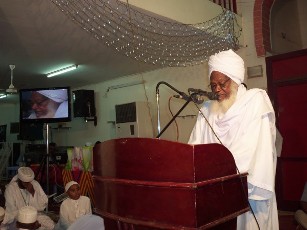Salafist group calls on Sudan’s government to avoid ending fuel subsidies
June 15, 2012 (KHARTOUM) – The Islamist Salafist Ansar Al-Suna group has urged Sudanese authorities to reverse the plan to end fuel subsidies, warning that it will not resolve the country’s economic crisis.
 Ansar Al-Suna’s leader Isma’il Osman Al-Mahi said during Friday prayer sermon at the mosque of the group’s headquarters in Al-Sajana area in Khartoum that the government should give up its plans to terminate fuel subsidies.
Ansar Al-Suna’s leader Isma’il Osman Al-Mahi said during Friday prayer sermon at the mosque of the group’s headquarters in Al-Sajana area in Khartoum that the government should give up its plans to terminate fuel subsidies.
Al-Mahi cited experts’ opinion saying that ending fuel subsidies is not going to help averting economic collapse.
“If it [lifting fuel subsidies] does not represent a radical solution, why the rush to implement it”
The Sudanese government is planning to terminate fuel subsidies as part of what officials say are drastic austerity measures required to make up for a budget deficit of 2.4 billion USD which resulted from the country’s loss of 75 percent of oil revenues following the secession of South Sudan last year.
According to government officials, ending fuel subsidies will save the country 2 billion USD annually.
Ansar Al-Suna leader proposed a number of alternative measures to confront the economic crisis, including prioritization of agriculture and reducing state spending through eradication of corruption.
He also said that there needs to be a strategy for managing Sudan’s resources in an efficient way that ends ages of wasteful and irresponsible policy of managing resources.
Ansar Al-Suna leader further announced that their ministers in the federal and state governments are willing to relinquish their positions in order to support the government’s austerity efforts and the citizens in this current economic situation.
Sudan has been grappling with rising inflation and a depreciating currency since losing oil, the lifeblood of the economy. Inflation hit 30 percent in May, mainly on food prices, as the Sudanese pound’s exchange rate against the dollars shot up to more than 5 in recent weeks.
Some observers warn that the ending of fuel subsidies might spark popular protests.
(ST)
